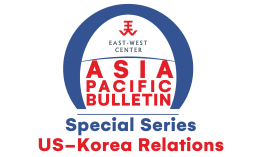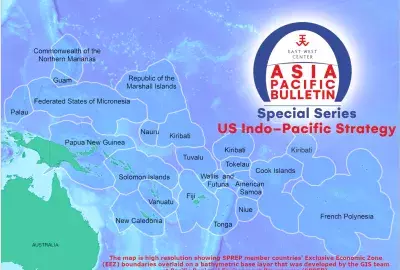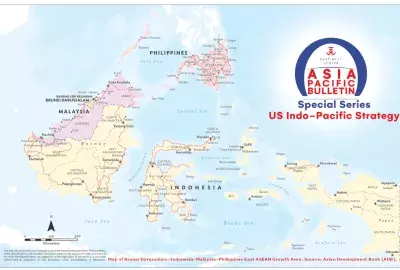Error message

|
Jenna Gibson, a PhD Candidate at the University of Chicago, explains why "listing off credibly popular cultural products coming out of South Korea and calling it soft power rings hollow" and how declarations of this type obscure the concept of soft power. |
In September 2021, during a whirlwind tour that included a performance and speech at the United Nations, global pop music powerhouse BTS sat down for an interview with ABC . But they were not alone, sitting in between the group members was Moon Jae In, then-president of South Korea. The Korean President had invited the boy band along on his trip to the General Assembly as newly appointed special presidential envoys for future generations and culture.
“The first mission I aimed to accomplish with BTS was to raise awareness for the UN’s Sustainable Development event. We’ve accomplished that goal already. It was a huge success,” President Moon said during the interview. “It was much more effective than the UN Secretary General or myself delivering hundreds of speeches.”
For Korea-watchers and foreign policy wonks alike, this statement perfectly encapsulates a concept that has been garnering increased attention in Korea policy circles and beyond —soft power.
To be clear, BTS has never been afraid to get political. Since their first single, the septet has been singing about South Korean social issues, ranging from the stress of the Korean education system to growing inequality. Nor was it their first time speaking at the UN—they have partnered with UNICEF for years and have spoken on the global stage about a variety of global issues. But with the group sitting next to President Moon in their new, official roles as special envoys, it was hard not to keep returning to the idea of pop culture as a driver of Korean soft power.
What is Soft Power?
While the term has popped up with increasing frequency in both policy analysis and media coverage of South Korea, it is worth taking a step back and considering what, exactly, soft power even is. This type of coverage will often begin with a list of films, television series, and bands—Parasite, Squid Game, BTS—before declaring that, because of the popularity of these stories and artists, Korean soft power is on the rise. But this obscures the concept of soft power, equating popularity with power in a way that misses the key points that its originator wanted to convey.
Introduced in the late 1980s by international relations scholar Dr. Joseph Nye, soft power was defined at first by its opposite—hard power. Hard power is defined slightly differently by different scholars, but generally comprises a combination of assets such as a country’s arsenal of military capabilities, technology, population, and economic strength. These tangible resources could be mobilized to ensure a country’s survival against its rivals in the international system, or to coerce other countries into taking certain actions. In fact, before Nye (and in a lot of international relations theory even through today), this is the only type of power that matters to explain interactions between countries.
Nye’s concept, therefore, was meant to be a direct challenge to this idea that military and economic strength are the key determinants of power international relations. His definition bears this out, focusing just as much on what soft power is not, “coercing,” than what it is, “co-opting.”
"A country may obtain the outcomes it wants in world politics because other countries—admiring its values, emulating its example, aspiring to its level of prosperity and openness—want to follow it. In this sense, it is also important to set the agenda and attract others in world politics, and not only to force them to change by threatening military force or economic sanctions. This soft power—getting others to want the outcomes that you want—co-opts people rather than coerces them." (Nye, 2004)
This origin story is not just a trip down the memory lane of international relations theory. It is to emphasize that the concept of soft power is specifically meant to contrast with hard, military power, by showing that attraction and co-option can still get a country what it wants on the international stage.
Therefore, listing off all the incredibly popular cultural products coming out of South Korea and calling it soft power rings hollow—without a particular goal in mind, or an audience to bring along with you, or ways of measuring effects.
Korean Soft Power?
South Korean soft power is just a bit narrower and often more nebulous, than standard narratives might imply.
BTS’ UN visit is a good example of a soft power moment where there is a clear goal—discuss and educate the public on the sustainable development goals (SDGs)—and a pop culture emissary whose goals and audience align well with the task at hand. Another example of this type of specific, strategic event that harnessed Korean pop culture into soft power was the inter-Korean concert in Pyongyang in 2018. Held ahead of the first Moon-Kim summit that spring, the concert brought K-pop artists and other South Korean singers to the stage to promote detente on the peninsula.
But the concert went further than just gaining attention—In an analysis of responses to clips of the 2018 Pyongyang concert posted to YouTube, there was indeed a significant amount of deeper discussion of the political issues underpinning the event, and that the commentary was overall positive and supportive. Preliminary analyses of BTS' visit to the UN and their most recent visit to the White House, appear to follow suit. In these cases, there was a specific goal on the agenda, such as promoting engagement between South Korea and its northern neighbor or drawing attention to the UN's Sustainable Development Goals.
But what happens when there isn't a specific goal in mind, but rather just a general sense of garnering interest for Korea as a country and culture? Or what if the goal exists but is more nebulous and harder to pinpoint with exact data, such as increasing awareness of Korea and its goals on the world stage? These are the questions that scholars who study public diplomacy and diplomats who implement it have been grappling with for years. With interest in soft power on the rise in the mainstream consciousness, policymakers in Seoul and around the world should consider these open questions carefully as they continue to craft their soft power strategies in the years to come.

|
Jenna Gibson, a PhD Candidate at the University of Chicago, explains why "listing off credibly popular cultural products coming out of South Korea and calling it soft power rings hollow" and how declarations of this type obscure the concept of soft power. |
In September 2021, during a whirlwind tour that included a performance and speech at the United Nations, global pop music powerhouse BTS sat down for an interview with ABC . But they were not alone, sitting in between the group members was Moon Jae In, then-president of South Korea. The Korean President had invited the boy band along on his trip to the General Assembly as newly appointed special presidential envoys for future generations and culture.
“The first mission I aimed to accomplish with BTS was to raise awareness for the UN’s Sustainable Development event. We’ve accomplished that goal already. It was a huge success,” President Moon said during the interview. “It was much more effective than the UN Secretary General or myself delivering hundreds of speeches.”
For Korea-watchers and foreign policy wonks alike, this statement perfectly encapsulates a concept that has been garnering increased attention in Korea policy circles and beyond —soft power.
To be clear, BTS has never been afraid to get political. Since their first single, the septet has been singing about South Korean social issues, ranging from the stress of the Korean education system to growing inequality. Nor was it their first time speaking at the UN—they have partnered with UNICEF for years and have spoken on the global stage about a variety of global issues. But with the group sitting next to President Moon in their new, official roles as special envoys, it was hard not to keep returning to the idea of pop culture as a driver of Korean soft power.
What is Soft Power?
While the term has popped up with increasing frequency in both policy analysis and media coverage of South Korea, it is worth taking a step back and considering what, exactly, soft power even is. This type of coverage will often begin with a list of films, television series, and bands—Parasite, Squid Game, BTS—before declaring that, because of the popularity of these stories and artists, Korean soft power is on the rise. But this obscures the concept of soft power, equating popularity with power in a way that misses the key points that its originator wanted to convey.
Introduced in the late 1980s by international relations scholar Dr. Joseph Nye, soft power was defined at first by its opposite—hard power. Hard power is defined slightly differently by different scholars, but generally comprises a combination of assets such as a country’s arsenal of military capabilities, technology, population, and economic strength. These tangible resources could be mobilized to ensure a country’s survival against its rivals in the international system, or to coerce other countries into taking certain actions. In fact, before Nye (and in a lot of international relations theory even through today), this is the only type of power that matters to explain interactions between countries.
Nye’s concept, therefore, was meant to be a direct challenge to this idea that military and economic strength are the key determinants of power international relations. His definition bears this out, focusing just as much on what soft power is not, “coercing,” than what it is, “co-opting.”
"A country may obtain the outcomes it wants in world politics because other countries—admiring its values, emulating its example, aspiring to its level of prosperity and openness—want to follow it. In this sense, it is also important to set the agenda and attract others in world politics, and not only to force them to change by threatening military force or economic sanctions. This soft power—getting others to want the outcomes that you want—co-opts people rather than coerces them." (Nye, 2004)
This origin story is not just a trip down the memory lane of international relations theory. It is to emphasize that the concept of soft power is specifically meant to contrast with hard, military power, by showing that attraction and co-option can still get a country what it wants on the international stage.
Therefore, listing off all the incredibly popular cultural products coming out of South Korea and calling it soft power rings hollow—without a particular goal in mind, or an audience to bring along with you, or ways of measuring effects.
Korean Soft Power?
South Korean soft power is just a bit narrower and often more nebulous, than standard narratives might imply.
BTS’ UN visit is a good example of a soft power moment where there is a clear goal—discuss and educate the public on the sustainable development goals (SDGs)—and a pop culture emissary whose goals and audience align well with the task at hand. Another example of this type of specific, strategic event that harnessed Korean pop culture into soft power was the inter-Korean concert in Pyongyang in 2018. Held ahead of the first Moon-Kim summit that spring, the concert brought K-pop artists and other South Korean singers to the stage to promote detente on the peninsula.
But the concert went further than just gaining attention—In an analysis of responses to clips of the 2018 Pyongyang concert posted to YouTube, there was indeed a significant amount of deeper discussion of the political issues underpinning the event, and that the commentary was overall positive and supportive. Preliminary analyses of BTS' visit to the UN and their most recent visit to the White House, appear to follow suit. In these cases, there was a specific goal on the agenda, such as promoting engagement between South Korea and its northern neighbor or drawing attention to the UN's Sustainable Development Goals.
But what happens when there isn't a specific goal in mind, but rather just a general sense of garnering interest for Korea as a country and culture? Or what if the goal exists but is more nebulous and harder to pinpoint with exact data, such as increasing awareness of Korea and its goals on the world stage? These are the questions that scholars who study public diplomacy and diplomats who implement it have been grappling with for years. With interest in soft power on the rise in the mainstream consciousness, policymakers in Seoul and around the world should consider these open questions carefully as they continue to craft their soft power strategies in the years to come.







